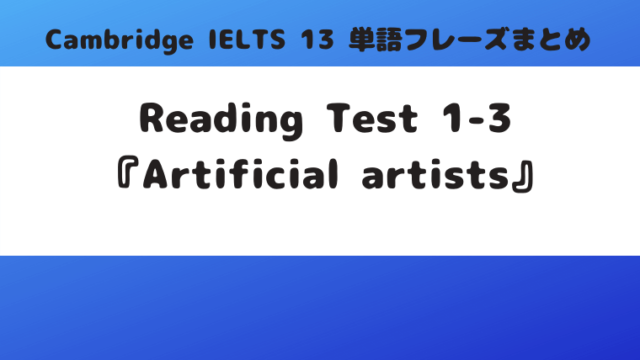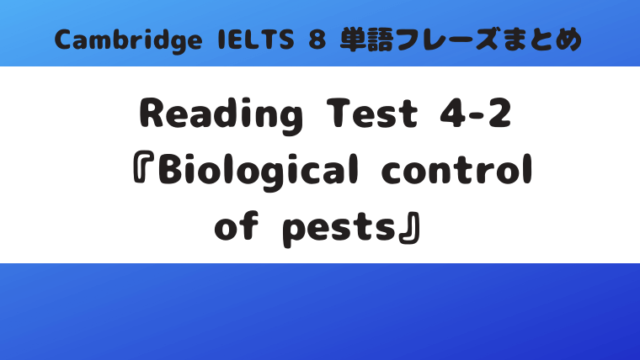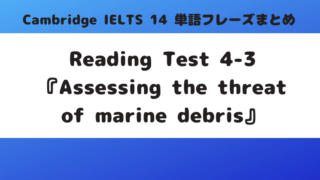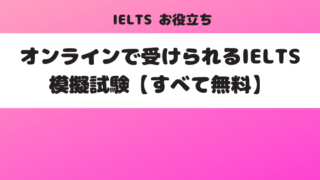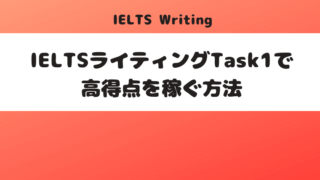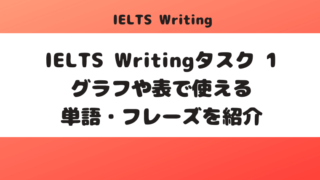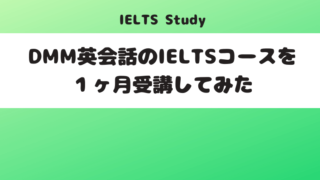「Cambridge IELTS 14」Reading Test4-2『Why zoos are good』の単語・フレーズをまとめました。
私がIELTS Readingの単語・まとめを行う理由は「Cambridge IELTS Reading単語・フレーズまとめ」からご覧ください。
Reading Test 4 Passage 2:Why zoos are good
- wildlife
noun /ˈwaɪld.laɪf/
animals and plants that grow independently of people, usually in natural conditions:
《U》 野生生物 - vary
verb /ˈveə.ri/
・If things of the same type vary, they are different from each other, and if you vary them, you cause them to be different from each other:
・to change or cause something to change in amount or level, especially from one occasion to another:
1 《自》 (同類の物の間で) さまざまである, 異なる
2 《他》 …に変化をつける - supplement
noun /ˈsʌp.lɪ.mənt/
・something that is added to something else in order to improve it or complete it; something extra:
・a part of a magazine or newspaper, either produced separately or as part of the magazine or newspaper:
・an extra part of a book, either produced separately or included at the end of the book, containing information that was not available when the book was first published:
1 補充(するもの), 補足
2 (栄養)補給剤
3 (書籍の) 補遺, 別巻
4 (新聞の) 特集版
5 (ホテル,サービス,乗車券などでの) 追加料金 - somewhat
adverb /ˈsʌm.wɒt/
to some degree:
いくらか, 若干 - ostracism
noun /ˈɒs.trə.sɪ.zəm/
the action of intentionally not including someone in a social group or activity
(集団などから) …を追放する, 村八分にする - suffer
verb /ˈsʌf.ər/
・to experience physical or mental pain:
・to experience or show the effects of something bad:
1 a) 《他》 <肉体的・精神的苦痛> を受ける
b) 《自》 苦痛を受ける
2 a) 《他》 <けが・傷・やけどなど> を負う, <心臓発作など> を起こす
b) 《自》 suffer from something
3 《他》 <困難・差別など> を経験する, 受ける
4 《自》 (困難・不快な状況などに) 苦しむ, 悩む
5 《自》 損なわれる
6 《他》 suffer somebody to do something 〘やや古〙
<人>が<…>するのを許す - irritation
noun /ˌɪr.ɪˈteɪ.ʃən/
・the feeling of being angry or annoyed, or something that makes you feel like this:
・a painful or sore feeling in a part of the body:
1 《U》 いらだち, いらいら
2 《C》 いらいらさせるもの, いらいらの種
3 《C, U》 ひりひりする痛み, 炎症 - parasite
noun /ˈpær.ə.saɪt/
・an animal or plant that lives on or in another animal or plant of a different type and feeds from it:
・disapproving a person who is lazy and lives by other people working, giving them money, etc.
1 寄生植物[動物], 寄生虫
2 〘けなして〙 パラサイト, 寄生虫のような人 - captive
noun /ˈkæp.tɪv/
a person or animal whose ability to move or act freely is limited by being kept in a space; a prisoner, especially a person held by the enemy during a war:
1 (戦争などで) 捕虜の
2 《名の前でのみ》 (動物などが) 捕らわれた 反意 wild
3 captive to something
<…>のとりこになった, に心を奪われた - life expectancy
1 (人・動物の) 推定[予想]寿命, 平均余命
2 (物の) 予想耐用期間, 推定寿命 - counterpart
noun /ˈkaʊn.tə.pɑːt/
・a person or thing that has the same purpose as another one in a different place or organization:
somebody’s / something’s counterpart
<…>の対応相手[対応物] - drought
noun /draʊt/
a long period when there is little or no rain
干ばつ, 日照り, 渇水 - starvation
noun /stɑːˈveɪ.ʃən/
the state of having no food for a long period, often causing death:
《U》 飢餓, 餓死 - colossal
adjective /kəˈlɒs.əl/
extremely large
1 (程度・数量などが) 膨大な, ばく大な, 途方もない, けたはずれの
2 巨大な, ものすごく大きな - collapse
verb /kəˈlæps/
・to fall down suddenly because of pressure or having no strength or support:
・If someone collapses, they fall down because of being sick or weak:
・to fold something into a smaller shape, usually so it can be stored, or (especially of furniture) to fold in this way:
1 《自》 <建物などが> 壊れる, 崩壊する
2 《自》 <人が> (病気・けがなどで) 倒れる, 卒倒する
3 《自》 <体制・計画・組織などが> つぶれる, 崩壊する
4 《自》 <価格・市場などが> 急落する, 暴落する
5 《自》 へたり込む, 倒れ込む
6 a) 《自》 <いす・テント・地図などが> 折りたためる
→ collapsible b) 《他》 …を折りたたむ
7 《自》 <肺・血管が> 虚脱する - bled
bleedの過去形
・to lose blood:
・(in the past) to make someone lose blood, as a cure for an illness
・If you bleed a closed system such as a radiator or a brake, you remove air or liquid from it to make it work correctly.
1 《自》 (けがなどで) 出血する, 血が出る
2 《他》 <人> から金を巻き上げる[搾り取る]
3 《他》 <機械など> から空気[水]を抜き取る
4 《自》 <色・染料などが> にじむ
同意 run
5 《他》 <人> から血を抜き取る - reservoir
noun /ˈrez.ə.vwɑːr/
a large supply of something:
1 貯水池
2 a reservoir of something
〘特に書き言葉〙 <…>の宝庫, 豊富な<…>
3 〘専門〙 (機械などの) 液体貯蔵器
4 〘専門〙 ガス[液体]のたまる場所 - extinction
noun /ɪkˈstɪŋk.ʃən/
a situation in which something no longer exists
絶滅, 消滅 - initiative
noun /ɪˈnɪʃ.ə.tɪv/
・a new plan or process to achieve something or solve a problem:
・the ability to use your judgment to make decisions and do things without needing to be told what to do:
・the power or opportunity to win an advantage
1 《U》 率先, 自発性
2 《C》 計画, 構想
3 the initiative 主導権, イニシアチブ
4 《C》 (米国・スイスにおける) 国民発案, 発議権 - specimen
noun /ˈspes.ə.mɪn/
・something shown or examined as an example; a typical example:
・a small amount of blood or urine used for testing
1 見本, 試料, 検体
2 標本
3 〘ユーモラス〙 あるタイプの典型的な人 - on display
展示[陳列]されて - absorb
verb /əbˈzɔːb/
・to take something in, especially gradually:
・to reduce the effect of a physical force, shock, or change:
・to understand facts or ideas completely and remember them:
1 <液体・気体・物質など> を吸収する
2 《通例受け身形で》 <人> を熱中させる, 没頭させる
3 <知識など> を吸収する, 取り入れる
4 <会社・組織など> を吸収合併する, <移民など> を受け入れる
5 <光・熱・音など> を吸収する
6 <苦境・問題など> に対処する, 対応する
7 <金・資源など> を費やす, 消費する
8 <衝撃など> を和らげる, 吸収する - outreach
noun /ˈaʊt.riːtʃ/
an effort to bring services or information to people where they live or spend time
アウトリーチ ((現場へ出ての福祉活動)) outreach program
アウトリーチ活動計画 - animal keepers
動物飼育係 - thereby
adverb /ˌðeəˈbaɪ/
as a result of this action
その結果, それによって - oestrus
=estrus
《動物》発情期 - procedure
noun /prəˈsiː.dʒər/
・a set of actions that is the official or accepted way of doing something:
・a medical operation:
・computing specialized a set of instructions in a computer program that does a particular task
1 《C, U》 (正しい・通常の) やり方, 手続き, 手順
2 《C》 〘フォーマル〙 (手術・生体組織検査などの) 医療処置 - bolster
verb /ˈbəʊl.stər/
to support or improve something or make it stronger
1 …を強化する, …にてこ入れする
2 <人> を元気づける, <自信・士気など> を高める - dose
noun /dəʊs/
・a measured amount of something such as medicine:
・an amount or experience of something, often something bad or unpleasant:
・uk slang a case of gonorrhoea (= a disease of the sexual organs)
1 (1回の) 服用[投薬]量
2 a dose of something
<薬品・放射線など>の用量
3 (行為・経験などの) 1回分, 一定量 - anaesthetics
anesthetic の英つづりの1つ
a substance that makes you unable to feel pain:
麻酔薬[剤] - vital
adjective /ˈvaɪ.təl/
necessary for the success or continued existence of something; extremely important
1 極めて重要な, 不可欠の
2 活気のある, 活力に満ちた
3 《名の前でのみ》 生命の維持に必要な - as a means of
~の手段[方法]として


